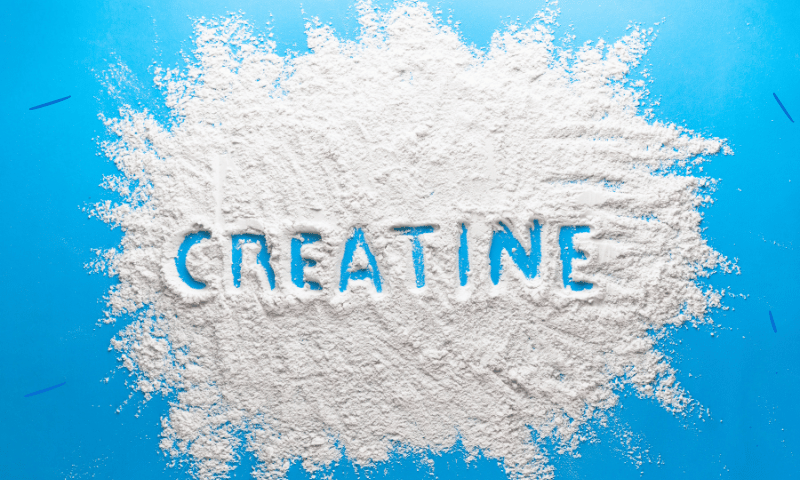
ALL ABOUT CREATINE
Creatine: the best supplement to boost sports performance
All about creatine: what is creatine, how does it work, its effects, which one to choose and how to take it
Creatine is one of the most researched and effective supplements for improving athletic performance.
In this article, we'll look at what creatine is, how it works, its effects, which one to choose and how to take it.
What is creatine?
Creatine is a natural substance found in the muscles and brain and is made up of three amino acids: arginine, glycine and methionine.
Although creatine can be obtained from foods such as red meat and seafood, it is common practice for athletes and fitness enthusiasts to take it as a dietary supplement.
How does creatine work in the body?
Creatine works by increasing muscle stores of phosphocreatine. Phosphocreatine is a key compound that helps in the rapid regeneration of adenosine triphosphate (ATP), the main energy source for muscle contractions.
When we do intense physical activity, ATP is used up quickly, and that's where creatine comes in, allowing ATP to be replenished faster, thus allowing longer and more intense workouts.
Effects of creatine
- Sports performance
Creatine is known for its ability to improve athletic performance.
Increasing muscle stores of phosphocreatine allows athletes to train at higher intensities and recover faster between sets of high-intensity exercises.
This leads to better results in activities such as sprints, weight lifting and other short, intense activities.
- Power and explosiveness
Many studies have shown that creatine supplementation increases muscle strength and explosiveness.
Due to improved muscle energy regeneration (ATP), muscles can work with greater strength and speed.
This is particularly useful for athletes involved in disciplines where short bursts of maximal power are crucial, such as weightlifting, jumping and sprinting.
- Muscle mass and recovery
In addition to its effect on strength and performance, creatine has other positive effects. These include improved muscle mass, which is the result of increased cell volume due to water retention in muscle fibres.
Creatine can also help reduce muscle fatigue and help you recover faster after exercise.
- Impact on the brain
Although creatine is widely known and popular for boosting athletic performance, it is also essential for the brain, as it is crucial for the brain's energy production.
A systematic review of six studies involving 281 subjects found that creatine supplementation improves short-term memory, mental acuity, reasoning and inference.
(Source: https://www.ncbi.nlm.nih.gov/pmc/articles/PMC6093191/
Studies also point to the potential positive impact of creatine supplementation on psychiatric and mental illnesses such as Huntington's and Parkinson's disease, anxiety disorders, depression and other mood disorders.
(Source: https://www.ncbi.nlm.nih.gov/pmc/articles/PMC3340488/
Why supplement with creatine?
Although creatine can be obtained from food, the optimal effects of creatine are seen when taking around 5 grams per day.
Since you would need to eat a huge amount of food to get the optimal dose of creatine (1kg of red meat has about 2g of creatine), creatine supplementation is a simpler and more affordable solution.
Product INN Creatine Pow 500g will last you for 100 days, a good 3 months, at a cost of €6 per month or €0.20 per day.
Which form of creatine to choose?
There are many types of creatine on the market nowadays, which leads to a lot of confusion and hesitation about which type to choose.
Of all the creatines, creatine monohydrate is still the most widely used, known and used.
For those who don't want the extra water and weight that comes with taking creatine, you can opt for a type of creatine that doesn't bind extra water in your body and muscles. We offer such a product Quamtrax Kre-Alkaline 3000.
Quamtrax Kre-Alkalyn 3000 has the same properties in terms of effect as regular creatine monohydrate, but it is better absorbed and does not lead to gains in body mass and muscle volume.
How to take creatine?
The recommended use of creatine is 5g per day.
The timing and the way creatine is taken is not important. You can mix it in water, juice, a smoothie or a protein shake and drink it. All that matters is that the creatine is taken regularly, every day.
For those of you who have never taken creatine before and are on the last leg, you will feel the effects after a few days of taking it (7-10 days of 5g). Creatine must first be stored in our body, from where it is then used by the body.
To speed up this process of creatine loading in your body, you can use a so-called "loading phase" where you take 20 grams of creatine per day for the first week, divided into several smaller doses (e.g. 4x5g). This way, the creatine will load in your body sooner and you will start to feel its effects sooner.
It is also advisable to drink more water and fluids while taking kratin, as creatine binds water in the pancreas and muscles, which can cause mild dehydration. During the initial phases of creatine supplementation, it is therefore recommended to drink 0.5l of water or more fluid per day.
Conclusion
Creatine is an effective and safe dietary supplement that can significantly improve athletic performance, strength and explosiveness, and have a positive effect on muscle mass and recovery after exercise.
If you want to reap the benefits of creatine to improve your athletic performance, check out our wide range of quality creatine supplements at affordable pricesor visit our ABP Sport store at Cankarjeva 12 in Nova Gorica.
Join the many satisfied customers who have improved their results with our products!